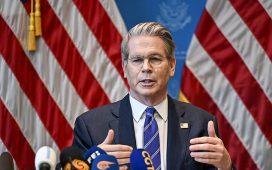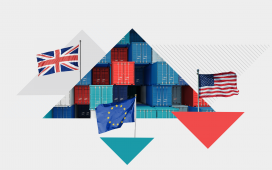Stay informed with free updates
Simply sign up to the War in Ukraine myFT Digest — delivered directly to your inbox.
The EU has agreed to give member states powers to end gas imports from Russia and Belarus nearly two years after Moscow’s full-scale invasion of Ukraine.
Any member state will be able to ban companies from Russia and Belarus from buying capacity in its gas pipelines and liquefied natural gas terminals, under a deal struck on Friday among negotiators of the European parliament, member states and the European Commission.
The proposal could provide a basis for EU energy companies to get out of contracts with Russian gas providers without having to pay hefty compensation, according to a senior official of the bloc.
While the 27-member bloc has gradually reduced its dependency on Russian energy following the February 2022 invasion, it still gets about a tenth of its gas supply, including LNG shipments, from the country. Several member states including Austria and Hungary still rely heavily on Russian supplies.
The European Commission wants to push member states to cut off remaining gas imports. Some member states including Poland and the Baltic states have been vocal in demanding tougher action against Moscow.
EU member states would be allowed to “partially or, where justified, completely limit” access to infrastructure to gas operators from Russia and Belarus “where necessary to protect their essential security interests”, according to the draft legislation. The final version must still be formally approved by the parliament and member states. The law is expected to enter into force in May next year.
Instead of an outright ban on Russian gas imports, which could have destabilised markets and was resisted by countries with few alternatives, the commission has attempted to persuade capitals to diversify their fuel sources, setting a target for the EU to be free of Russian fossil fuels by 2027.
In the third quarter of 2023, Russia supplied about 12 per cent of total EU gas imports, according to Eurostat.
An uptick in imports of Russian LNG over the past year has been a particular concern, not least because it provides a crucial source of funds to Moscow for its war effort against Ukraine.
The FT reported in August that the EU was importing record volumes of the super-chilled fuel from Russia despite the 2027 target.
Kadri Simson, the EU’s energy commissioner, said on Friday that she had “called on member states to phase out Russian LNG imports on many occasions” and that she was glad that EU governments could now “effectively limit or fully stop access of Russian gas to its gas networks”.
Belgium and Spain, which have large regasification terminals for the liquid fuel, have become the biggest importers of Russian LNG behind China this year.
The Netherlands has banned new contracts for the trans-shipment of Russian LNG, which involves the transferral of gas between Russian Arctic-bound ice breaker ships and tankers that take the fuel on to more temperate countries, particularly in Asia.
But Belgium, Spain and France have permitted the import and re-export of Russian LNG to continue, arguing that it is difficult for their companies to extract themselves from existing contracts.
Other countries including Germany also use LNG imported through other countries in western Europe.
“I know that Belgium, with our energy terminal, is still helping or facilitating . . . that this [LNG] still comes in. Surely we don’t need it for ourselves but neighbouring countries still do,” said Tinne Van der Straeten, Belgium’s energy minister, told the FT.
She added that “with the 2027 target in mind” there should be a “European approach” to banning the last vestiges of Russian gas.
The EU has proposed that the bloc extend measures taken during the gas crisis last year to stabilise prices by cutting gas demand by 15 per cent and continuing a cap on prices for another year.
The extension is due to be agreed by EU energy ministers on December 19 but Friday’s agreement means that there should be less need for the emergency measures to be used, the official said.
Climate Capital

Where climate change meets business, markets and politics. Explore the FT’s coverage here.
Are you curious about the FT’s environmental sustainability commitments? Find out more about our science-based targets here










